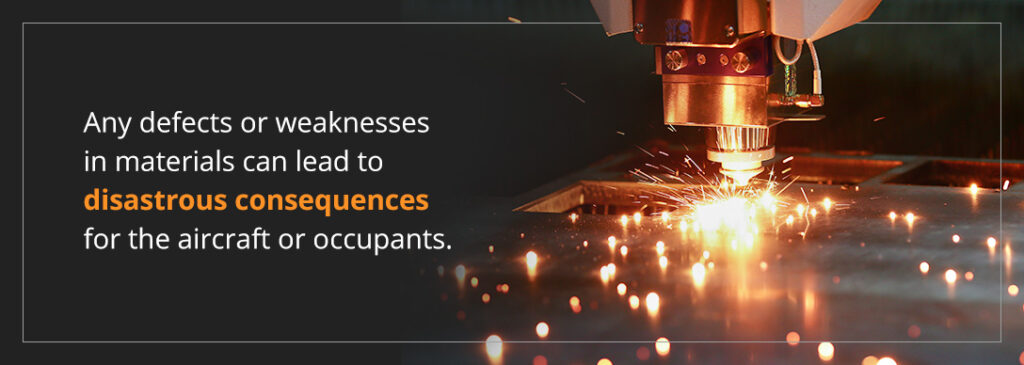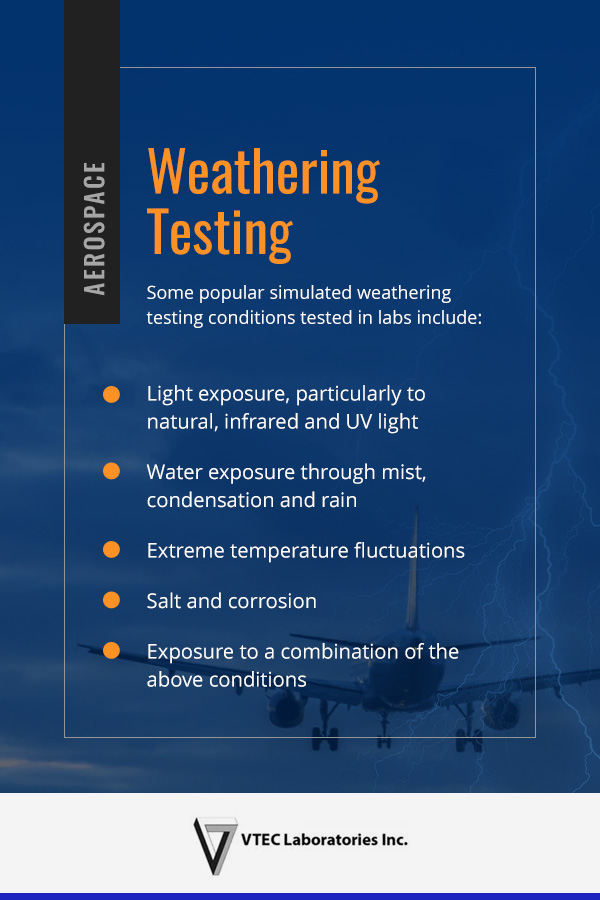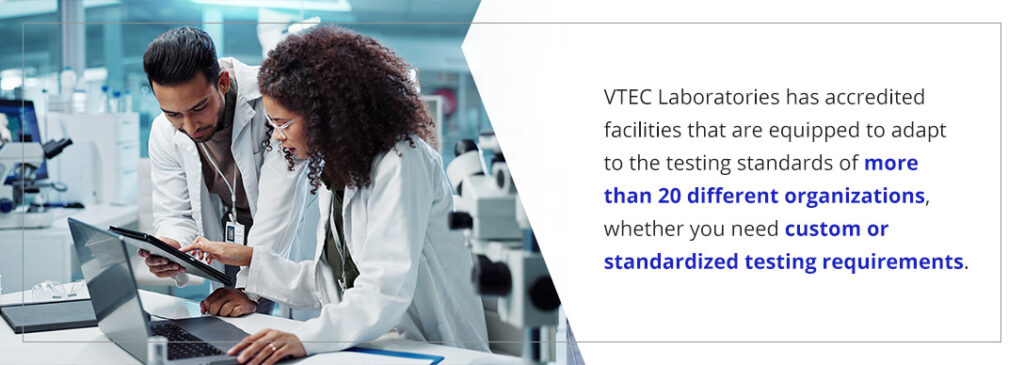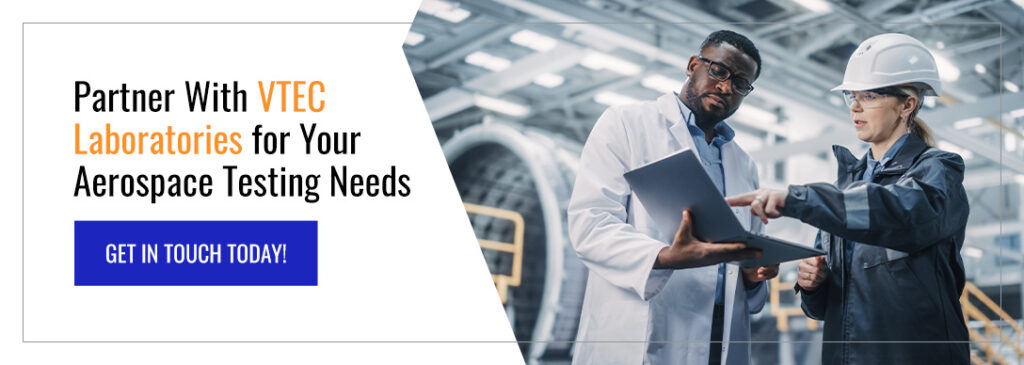Testing and Evaluation Services in Aerospace
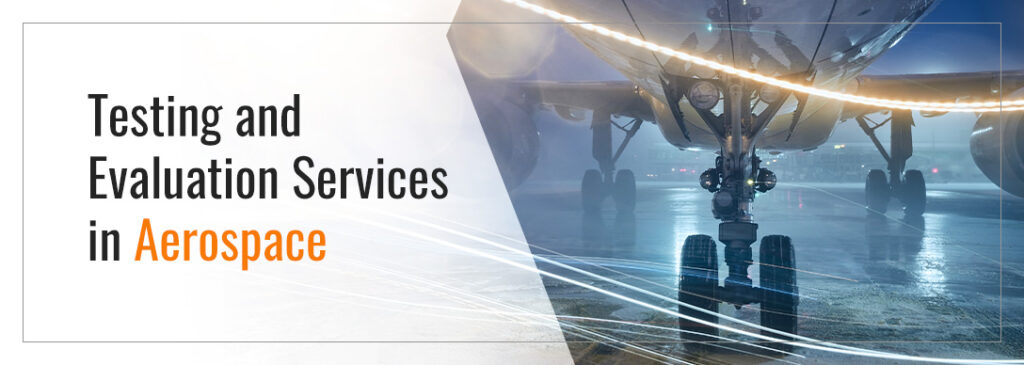
The aerospace industry is responsible for researching, developing and manufacturing various flight vehicles. These structures include aircraft and spacecraft and their systems, engines and parts, as well as key subsystems like propulsion and avionics.
Testing and evaluation services in aerospace are necessary due to the complexity of the market and equipment consisting of millions of working parts. Any materials used in this industry must meet stringent performance criteria. That's why an aerospace testing lab plays a critical role in ensuring the safety, reliability and compliance of these aerospace components and systems.
Learn about the types of tests aerospace elements typically require, industry-relevant standards that are relevant to your products and projects, and VTEC Laboratories' customized testing services.
Types of Aerospace Component Testing
A wide range of specialized assessments exist to ensure aerospace components and systems are safe and reliable.
1. Fire and Flammability Testing
Fire and flammability testing evaluates the response of aerospace materials, components and systems used in aircraft against different fire conditions. This testing assesses whether critical components can continue to function as intended during a fire, helping to maintain essential systems' operability in extreme or emergency situations.
Tests may include static pressure, airflow, vibration and static load tests using kerosene and propane fire burners. Fire and flammability testing measures factors like:
- Ignition time
- Flame spread
- Heat release rates
- Smoke generation
- Toxicity levels
Data gathered from these tests inform manufacturers and engineers what materials to select for different aircraft components. As these tests identify potential hazards and weaknesses in materials or designs, they can take proactive measures to mitigate risks and enhance safety in aerospace applications.
2. Chemical Analysis and Material Testing
Material integrity is important in the aerospace industry due to the critical roles different components play in aircraft. Aerospace components must be able to withstand extreme conditions such as high speed, temperature and pressure variations, and vibrations. Any defects or weaknesses in materials can lead to disastrous consequences for the aircraft or occupants.
Rigorous testing helps prevent such failures. Chemical analysis and material testing play a major role in the type of materials that are used in aircraft components. Chemical analysis focuses on the composition of materials in structural elements, engine parts and avionics.
Chemical analysis and material testing in aerospace often includes:
- Electrochemistry: This test determines the resistance, breakdown voltage and current and dielectric constants by evaluating the electrical properties of materials.
- Heavy metals testing: Heavy metals testing confirms that materials used in aerospace components contain no hazardous levels.
- Chromatography: High-performance liquid chromatography and gas chromatography analyze plastic extracts for residual or odorous compounds, flame retardants and other chemical properties relevant to aerospace materials.
- SDS testing: Safety data sheet (SDS) testing ensures compliance with regulations regarding substances like phthalates, heavy metals, volatile organic compounds and hazardous air pollutants.
- Spectroscopy: These tests, such as Fourier transform infrared spectroscopy, use special optics to scan test materials and learn their chemical properties with infrared light and radiation.
- XRF: X-ray fluorescence for elements.
In comparison, material testing verifies physical, mechanical and structural properties. Material testing in aerospace may include mechanical and non-destructive testing (NDT).
In the aerospace industry specifically, material testing supports continuous improvement in material design and manufacturing processes. VTEC Laboratories also has a team of engineers, technicians and scientists to help with material failure analysis. Together, we can determine why a component failed and develop a solution to prevent future errors.
3. Thermal Testing
Knowing how certain materials will react to temperature changes is important to maximize their performance and minimize the risk of product failure in aerospace components. Thermal testing for aerospace components involves assessing how materials and components perform under the various temperature conditions these items may encounter during operation.
Aircraft and spacecraft operate in extreme thermal environments, including high heat generated by engines, cold temperatures at high altitudes and general rapid temperature changes. Aerospace materials need to withstand these temperature variations without degrading.
Different types of thermal testing exist for aerospace components:
- Thermal conductivity: This test confirms how well a material conducts heat, which is necessary for efficient heat dissipation.
- Thermal expansion: Measuring how much material expands or contracts with temperature changes helps predict dimensional changes.
- Heat resistance: Heat resistance testing determines the ability of materials to withstand high temperatures without degrading or losing their mechanical properties.
- Thermal recycling: This simulates repeated temperature fluctuations to assess how materials perform under thermal cycling conditions, which can cause fatigue over time.
- Environmental: Thermal shock, humidity and altitude tests help to evaluate material performance under different environmental conditions.
4. Physical Testing and Analysis
Physical testing and analysis processes evaluate the mechanical properties, structural integrity and performance characteristics of materials and components used in aircraft and spacecraft. These tests are essential to ensure these materials and components meet the aerospace industry's demanding conditions.
Physical tests are important for the following reasons:
- Structural integrity: Materials used in aerospace components must withstand mechanical stresses, vibrations and loads experienced during flights.
- Quality assurance: Conducting physical tests allows manufacturers to verify that materials meet design specifications, industry standards and regulatory requirements.
- Failure prevention: Physical testing processes can help identify material weaknesses or defects that could compromise systems.
In the aerospace industry, the following physical tests are commonly conducted to ensure quality:
- Corrosion and immersion testing: This test determines how well a material withstands corrosion and immersion in various environments, especially harsh conditions.
- Elemental analysis and testing: To verify materials' purity and identify contaminants, these tests determine their elemental composition.
- Mechanical and structural properties testing: Physical testing helps assess properties such as tensile strength, compression resistance, hardness, fatigue resistance and impact toughness to determine how materials will perform under operational conditions.
5. Weathering Testing
Aerospace materials must be durable in different environmental conditions. Weathering testing helps to evaluate how materials will withstand exposure to factors such as sunlight, moisture, temperature fluctuations and other environmental stressors they may encounter. This allows manufacturers and engineers to revise product designs when necessary to withstand these conditions.
Some popular simulated weathering testing conditions tested in labs include:
- Light exposure, particularly to natural, infrared and UV light
- Water exposure through mist, condensation and rain
- Extreme temperature fluctuations
- Salt and corrosion
- Exposure to a combination of the above conditions
Weathering testing helps ensure aerospace products meet industry standards and regulatory requirements for durability and reliability. It also provides essential data for modifying product designs based on weather performance. Accelerating testing measures offer these advantages with the added bonus of greater efficiency, allowing you to receive your data faster than conventional methods allow.
Ensuring Quality Assurance in Aerospace Engineering
The aerospace industry makes advances every year. Scientists and engineers continue to design and provide more powerful and efficient ways to explore the atmosphere and beyond. To do so, aerospace manufacturers must conform to safety and quality standards.
Quality assurance plays a pivotal role for the following reasons:
- Standards compliance: Manufacturing processes must adhere to industry standards and regulatory requirements set by aviation authorities, such as the Federal Aviation Administration, NASA, and European Union Aviation Safety Agency.
- Product conformance: Quality assurance verifies that aerospace components and systems meet design specifications, performance criteria and safety standards through rigorous testing and inspection.
- Risk mitigation: Identifying and mitigating risks associated with manufacturing defects, material failures and operational hazards enhances product safety.
- Supplier quality management: Evaluating and monitoring suppliers ensures the quality of raw materials, components and subsystems.
- Traceability: Through documentation, serialization and configuration management, you can track the history of different parts throughout their lifecycle.
- Continuous improvement: Implementing feedback mechanisms, corrective actions and preventive measures based on quality data analysis drives continuous improvement in manufacturing processes.
VTEC Laboratories maintains the highest quality standards in aerospace standards testing. By adhering to rigorous testing protocols, we continuously help manufacturers improve operations and uphold their reputation by ensuring the integrity of their products in a dynamic and demanding sector.
Meeting Regulatory Compliance in the Aerospace Industry
The aerospace industry follows a robust framework of regulatory requirements. Meeting these guidelines and testing products and components means companies can fulfill customer expectations and provide safe and reliable aerospace systems.
Aerospace Industry Standards and Regulations
Aerospace standards and regulations come from several sources:
- Federal Aviation Regulations: Set by the FAA, these regulations cover all aspects of civil aviation in the United States and include standards for aircraft design, maintenance, operations and safety.
- ASTM International standards: The American Society for Testing and Materials (ASTM) develops and publishes voluntary consensus standards relevant to aerospace, covering testing methods, materials specifications and performance requirements.
- Aircraft manufacturer standards: Aircraft manufacturers have their own set of standards and specifications for testing and certification. These standards cover a wide range of areas, including materials testing, structural integrity assessments and system performance evaluations.
- AS9100 standard: Produced by the International Aerospace Quality Group, this quality management system standard is specifically tailored for the aerospace industry, focusing on risk management, traceability, configuration management and compliance with regulatory requirements.
- Nadcap: The National Aerospace and Defense Contractors Accreditation Program (Nadcap) provides accreditation for special processes used in aerospace manufacturing and ensures compliance with industry standards for processes such as NDT.
- RTCA DO-160 compliance: Developed by the Radio Technical Commission for Aeronautics (RTCA), DO-160 defines test procedures for various environmental conditions and test procedures for airborne equipment.
- SAE International standards: The Society of Automotive Engineers (SAE) develops technical standards for aerospace engineering in categories like aircraft structures, propulsion systems, avionics and safety protocols.
VTEC Laboratories is accredited by many authorities and performs testing according to industry standards that can accommodate requirements in all countries.
Aerospace Testing Requirements
VTEC Laboratories conducts aerospace testing according to several industry standards, including:
- ASTM C177: This test measures the heat transmission properties using a guarded hot-plate apparatus.
- ASTM C201: This test, conducted under steady-state conditions at room temperature, determines the thermal conductivity of solid, homogeneous and isotropic products.
- ASTM D2863: To measure the minimum concentration of oxygen in volume percent, this test uses a mixture with nitrogen to support the flaming combustion of plastic under specified laboratory conditions.
- ASTM E162: By using a radiant heat energy source, this surface flammability test determines the burning behavior of materials by assessing the flame spread index and heat evolution.
- ASTM E662: This standard describes the specific optical density of smoke generated by solid materials as they burn.
- ASTM E1354: This test uses an oxygen consumption calorimeter to determine the heat and visible smoke release rates for materials and products.
- ASTM F814: This test measures the specific optical density of smoke generated by solid materials.
- BSS 7238: A flammability test, this Boeing standard measures the optical smoke density of aircraft materials.
- BSS 7239: This Boeing standard measures toxic gas generation by materials on combustion.
- FAA/FAR 25.853: This test specifies the flammability requirements for aircraft seat cushions. It involves exposing material samples to a flame and measuring burn length and rate.
- FAA/FAR 25.855: This tests the flammability of cargo and baggage compartments in aircraft. It involves a fire resistance test for material liner panels and parts.
- NASA STD 6001
Solutions for Custom Aerospace Testing Needs
Manufacturers and engineers may require custom testing solutions for their aerospace products or systems. This includes tailored testing parameters to suit specific material requirements.
VTEC Laboratories has accredited facilities that are equipped to adapt to the testing standards of more than 20 different organizations, whether you need custom or standardized testing requirements. Additionally, we can help with on-site testing needs so you can evaluate and design specific products where shipment proves challenging. Most of our available tests are customizable, from full-size to small-scale testing.
When you choose custom testing, you receive expertise in various industries and testing standards that deliver actionable results. Additionally, we can provide you with a personal approach to the development and implementation of your custom test, with high levels of support throughout the process.
Frequently Asked Questions About Our Aerospace Testing Services
Manufacturers, engineers and scientists are often pushing the boundaries of what is possible in aerospace engineering. Our team at VTEC Laboratories helps make that possible with custom testing solutions, all while helping companies stay compliant with relevant certifications and regulations.
Would you like to learn more about aerospace testing services and how VTEC can meet your needs? Below, we answer commonly asked questions about our aerospace testing services to help you make an informed decision.
How Does VTEC Laboratories Ensure Compliance With Aerospace Standards?
We believe that having additional documentation and certification abilities above what's required allows us to offer a range of standardized testing options. This provides organizations with the knowledge that their products comply with multiple standards for quality, safety and performance.
We keep up to date with the latest information regarding regulations for products and materials. Our testing facility is accredited with ISO 17020, 17025 and 17065. Complying with aerospace testing standards as part of your quality management process benefits you as a manufacturer, providing you with an improved reputation, streamlined production processes and lower chances of risk.
What Sets VTEC Laboratories Apart in Aerospace Testing and Evaluation Services?
Due to our extensive expertise in the aerospace industry, we can provide comprehensive services that meet strict and unique standards, needs and objectives. We serve many aviation and aerospace organizations to ensure their products are safe and reliable. Our testing facility ensures your organization can test its products and evaluate their chemical, electrical, mechanical and thermal properties as necessary.
Whether you need aerospace component testing in a lab, on-site or in the field, we are committed to delivering exceptional services and customer support. We can also design custom tests to meet your project's unique requirements. Our clients value our responsiveness and professional and efficient service delivery.
Partner With VTEC Laboratories for Your Aerospace Testing Needs
Aerospace component testing plays a critical role in ensuring the reliability and compliance of these systems. Aerospace components must meet strict safety standards to ensure they can withstand extreme conditions with minimum risks. When you work with an experienced team with accredited testing facilities, you can expect accurate results and be sure that your systems comply with international standards.
VTEC Laboratories is a leading international commercial and testing service provider. With more than four decades of experience, we provide a wide range of testing abilities, listing labeling and follow-up inspection services that verify product compliance with regulations and standards. With our comprehensive range of services, including chemical analysis, materials testing, thermal testing, weathering testing, and fire and flammability testing, you're sure to receive unparalleled testing assistance.
Additionally, we can address unique project requirements or challenges with standardized and custom tests to ensure your aerospace system functions as intended. Our team of engineers and technicians is committed to precision, reliability and innovation in all industries.
To find out more about how VTEC can help you with your aerospace testing needs, get in touch with us today.

